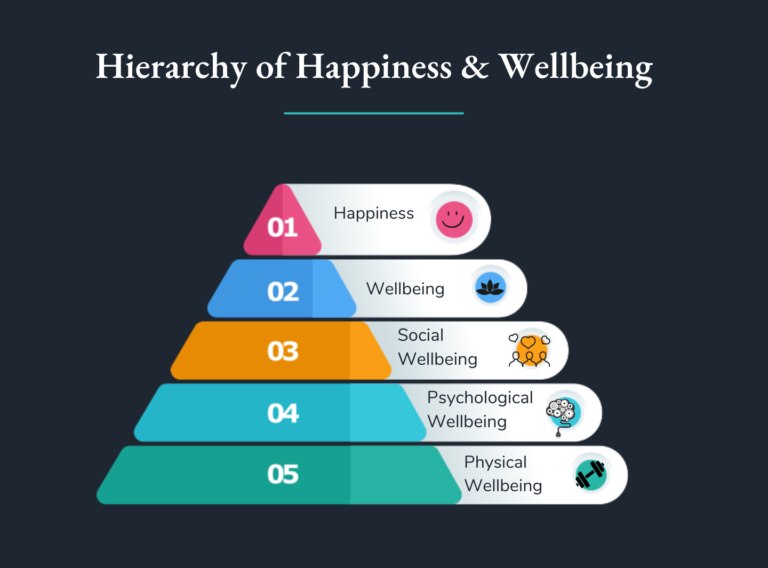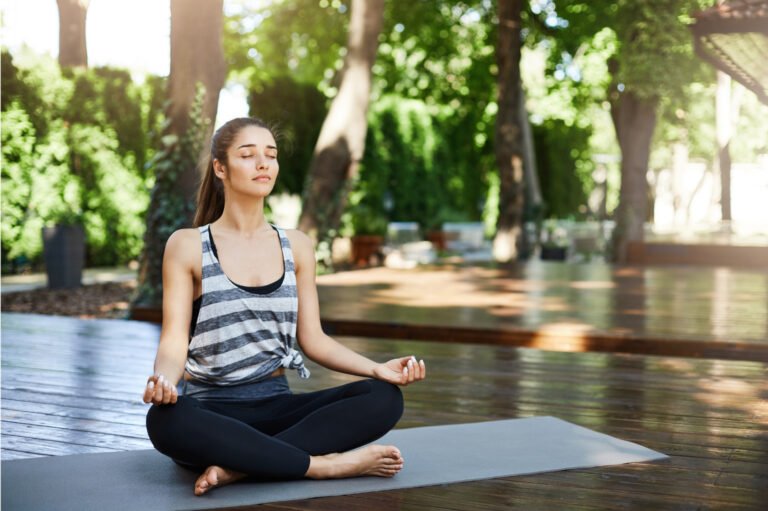Relationship Between Happiness And Wellbeing: 20 Habits That Can Influence Happiness

"
The greatest gift of life is Happiness. In this article, you will learn about Happiness and its relationship with well-being.
If you are working hard 24*7, constantly trying to chase your dreams. It is because you want to feel content and feel happy about that.
Happiness can promote the overall well-being of individuals. Remember! If you are happy, it means you are doing well.
Here is how and why?
Let's dive right in..
Recently, the circular economy has been a radical departure from the traditional linear economy model. Usually, in the linear economy, resources are typically extracted, turned into products, used, and discarded as waste. But in the circular economy, they try to minimize waste and use resources more efficiently, creating a closed-loop system that benefits both the environment and the economy.
What is Happiness?
Let me explain.
Philosophers have traveled lengths and breaths to find that happiness. That is the goal. Don’t they call it Paramananda? Bliss.
That is the end goal of our lives.
Imagine a golden retriever with its owner. Wagging tail, excited zooming, playful tackling, the doggy smiles, brightly lit up eyes, and demanding for belly rubs.
Doesn’t it make you wonder you could too be like that in emotion?
If you take away all the activities and only count on the emotion that the golden retriever is brimming with, that is happiness.
Happiness, in the context of mental or emotional states, is positive or pleasant emotions ranging from contentment to intense joy. Other forms include life satisfaction, well-being, subjective well-being, flourishing and eudaimonia.
Happiness has been a concern for centuries, Beginning with Ancient Greek Philosophy and Western European Moral Philosophy after the Enlightenment On current quality of life and well-being research in social, political and economic sciences.
Philosophers and religious thinkers often define happiness as It thrives, not just as an emotion. Sociologists Define Happiness in terms of Social Aspects and human relationships in society. Practitioners define happiness as a state of perfection Not just as an emotion, but as a physical health.
One economist defines happiness as a state of good economic situation, not just as an emotion. Psychologists define happiness as: Good mental health and psychological well-being.
In short, Happiness and well-being are different for professionals in different fields and specialties.
As a scientific enterprise, Positive Psychology focuses on understanding and explaining Accurate predictions of well-being and subjective well-being and the factors that influence such conditions.
As a clinical effort, positive psychology is associated with increased subjective well-being Happiness, not correcting deficits.
Key Takeaway
Happiness is a complex concept that can be defined differently by professionals in various fields, but it generally refers to positive or pleasant emotions, ranging from contentment to intense joy, and can be influenced by a range of factors, including social, economic, and psychological conditions.
Happiness and Wellbeing
A Happy Mind is a Happy Soul
Our emotions have an effect on our mental state. Emotions are important for a healthy mental state. Emotions are the simplest form of communication that do not need words.
A baby cannot speak words to explain their needs. They aren’t even capable of exactly what they need. They only understand emotion. Hungry. Angry. Scared. Happy. Sad. Content. Excited. Confused. Awestruck.
Emotional development is something that a lot of pediatrics are focusing on for healthy growth. Emotions are so prominent in children that most of their training is done through these emotions.
Associating certain activities with happy emotions and some with sad and angry emotions.These emotions impact our decision and mind.
Mind and Body are always in sync. In the state that your mind is in, your body will reflect.
The best way to prove this is the Placebo Effect.
The Placebo Effect
Let's dig a little deeper
A placebo is a treatment that has no beneficial properties, such as: B. Sugar Pills. There are many clinical studies reporting improvement in symptoms in people who took a placebo instead of active treatment. Just believing in a cure can change the course of a person’s physical illness.
"
The placebo effect isn’t just a positive mindset, believing that a treatment or procedure will work. It’s creating a stronger connection between the brain and the body and how they work together,
Ted Kapchuk
Ted Kapchuk, a professor at Harvard’s Beth Israel Deaconess Medical Center, said the study focused on the placebo effect.
“Placebos do not lower cholesterol or shrink tumors. Instead, placebos act on symptoms that are regulated by the brain, such as pain perception. It can’t be cured,” says Kapchuk. “They have been shown to be most effective for conditions such as pain management, stress-related insomnia, and side effects of cancer treatment such as fatigue and nausea.”
How the placebo works is not yet fully understood, but it can range from increasing feel-good neurotransmitters such as endorphins and dopamine to activating specific brain regions associated with mood, emotional response, and self-awareness.
It is a complex neurobiological response that includes everything from increases in feel-good neurotransmitter chemicals like endorphins and dopamine.
Take it from a biotechnologist, one of the most active treatments in small health problems is placebo treatment.
When the doctor feels like a medicine will show more side effects than help in treatment, they will give a placebo dose to the patient and they return back saying they feel great.
Key Takeaway
The placebo effect is a complex neurobiological response that can improve symptoms of pain, stress-related insomnia, and side effects of cancer treatment, and involves a stronger connection between the brain and the body.
Wellbeing is for the Sake Of Happiness
Here is thing,
You need to understand the whole idea of well being is linked with happiness. We all talk about taking care of ourselves because that is how you become a happy person. The hierarchy of Happiness and Wellbeing even proves the same.
5. Physical Wellbeing
The lowest tire is the physical wellbeing. This is where it all starts. For the base of the entire tower stands of this physical wellbeing.
4. Psychological Wellbeing
In the hierarchy, this level is psychological well-being. Psychological health can be defined by the proper functioning of the psychological system.
Positive functions include her six dimensions of psychological well-being: self-acceptance, positive relationships with others, personal growth, life purpose, mastery of the environment, and autonomy.
Each aspect of mental health contributes to Psychological wellbeing.
3. Social Wellbeing
This is the wellbeing of your social surroundings. The people you are surrounded by and the environment in which you live in. You are strongly associated with the environment you live in.
If you pour bad smelly water onto a rose plant, after a while, it will lose its great smell.
2. Wellbeing
Positive psychological definitions of happiness generally include: active pursuit of happiness, balance of attributes, positive influence or life satisfaction, prosocial behavior, multiple dimensions, and personal optimization. Includes general characteristics.
Happiness can therefore be defined as the combination of positive functions of physical, psychological, emotional, social, mental and economic systems.
1. Happiness
The highest is Happiness. Why? Because this is the whole process of wellbeing.
When you focus on the overall wellbeing, you will find happiness. Happiness is the fruit of watering well being in your rose-plant like self.
How To Influence Happiness?
Now, this is important,
We all want to be happy. Here’s how to actually influence happiness with yourself.
- Always do some social service
- Eat good nutritious food
- Exercise
- Sleep Tight
- Compliment yourself and others
- Smile Please!
- Avoid comparing yourself to others
- Declutter your room
- Go out to meet with friends every once in a while
- Put away your phone for a while
- Create a self-care ritual
- Give back to the community
- Take time to reflect
- Update your goals
- Let go of your grudges
- Take a trip
- do some meditation
- Learn the word thank you
- Work-life balance and Study-life balance
- Letting that age add up to you



1. Always do some social service
Do some social service work outside of calling out people off social media. Do some ground work on spreading happiness. Happiness is contagious.
2. Eat good nutritious food
Good food is equal to good life. Like we told you earlier, good food is the base for physical health.
3. Exercise
You will be surprised how much of your negative energy will be burnt away from exercise. It has the ability to become an outlet for the energy that will cause you problems.



4. Sleep Tight
A good sleep is highly required. A deep undisturbed sleep of 4 hours is needed. According to a study, when you sleep at night on 1hr of sleep is just undisturbed sleep. You need to have 4 hours of undisturbed sleep and you’ll find yourself happier.
5. Compliment yourself and others
When you like the shirt another person is wearing, go tell them, “hey, your shirt looks great.” Compliment others and compliment yourself when you have done something great.
6. Smile Please!
Smiles release endorphins, serotonin, and dopamine. All the happy and pain killing natural hormones. Seeing someone smile or smiling in the mirror at yourself. Both these release those hormones. So, smile away at people. They will get their dose of happiness and smile at yourself in the mirror to get your dose of happiness.
7. Avoid comparing yourself to others
This is important because comparing yourself with others will definitely leave you unhappy. Jealousy isn’t exactly a great emotion. It is also negative and will drive away happiness.
8. Declutter your room
Throw away the things you don’t use or don’t need. Take out the clothes you don’t wear anymore. Take out all the books you aren’t reading at all and donate them to a library nearby. Declutter the things you have collected thinking you’ll need it later.
9. Go out to meet with friends every once in a while
Remember the hierarchy of wellbeing and happiness? The third one is social wellbeing. So, go meet the friends who make you feel good about yourself and relax you.
10. Put away your phone for a while
Keep that phone down for some time. Scrolling and scrubbing the phone all the time is not a good idea. Do some glass painting or DIY activity.


11. Create a self-care ritual
Make yourself a ritual that involves overall wellbeing. It should cover all the aspects of wellbeing.
12. Give back to the community
Always try to give back to community. Not just in terms of money but in terms of physical help. If there is a social service being done, go volunteer there.
13. Take time to reflect
Take a moment to reflect back on the whole day. Categorize which things led to positivity and which led to negativity.
14. Update your goals
Check where your yearly goals, monthly goals, everything which you can. Did you even move at least a micrometer towards your year goal?
15. Let go of your grudges
Don’t hold onto anger on someone else. It will multiply the sadness present in your life. Learn to let go. This is hard to do but we, at The One Liner, have tried to simplify it for you.
16. Take a trip
Move out of your mundane schedule of school-home, college-home, or work-home. Give that brain of yours some rest from that continuity of everyday struggle.
17. Do Some Meditation
Look at Buddha, or Shiva. Do they ever look unhappy? They’re symbolic for meditation. You can be that happy too. Try meditation.
18. Learn the word thank you
Trust it will bring happiness to you. Law of Karma is true. What you give comes back. The gratitude that you give will come back to you.
19. Work-life balance or Study-life balance
All work and no play makes Jack a dull boy. So, balance how much you work or study and your hobbies and family time.
20. Letting that age add up to you
Have you ever noticed the Greek sculptures of philosophers or paintings of Indian sages? They are all depicted as old. It is symbolic of being wiser. So, let that age give you wisdom too.
Final Thoughts
As we hit the end of the article,
Remember that all of our wellbeing is focused on making us happy. Evaluate on what actually makes you happy and what makes you sad. Try to eliminate the sad parts and encourage the happy parts.
Subscribe to new post
The One Liner
Useful Links
Order Related Queries
Useful Links
Order Related Queries











Such a message driving article, felt good as soon as i read it, as a healthy person it feels validating to check off a few of them. Thanks for patting me on the back to keep me going❤️